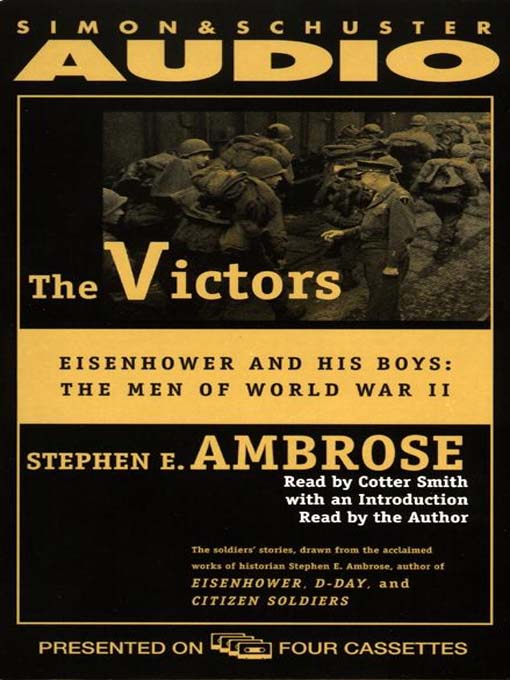The Victors
Eisenhower and His Boys: The Men of World War II
This authoritative narrative account is drawn by the author himself from his five acclaimed books about that conflict, most particularly from the definitive and comprehensive D-Day and Citizen Soldiers, about which the great Civil War historian James McPherson wrote, "If there is a better book about the experience of GIs who fought in Europe during World War II, I have not read it. Citizen Soldiers captures the fear and exhilaration of combat, the hunger and cold and filth of the foxholes, the small intense world of the individual rifleman as well as the big picture of the European theater in a manner that grips the reader and will not let him go. No one who has not been there can understand what combat is like but Stephen Ambrose brings us closer to an understanding than any other historian has done."
The Victors also includes stories of individual battles, raids, acts of courage and suffering from Pegasus Bridge, an account of the first engagement of D-Day, when a detachment of British airborne troops stormed the German defense forces and paved the way for the Allied invasion; and from Band of Brothers, an account of an American rifle company from the 506th Parachute Infantry Regiment who fought, died, and conquered, from Utah Beach through the Bulge and on to Hitter's Eagle's Nest in Germany.
Stephen Ambrose is also the author of Eisenhower, the greatest work on Dwight Eisenhower, and one of the editors of the Supreme Allied Commander's papers. He describes the momentous decisions about how and where the war was fought, and about the strategies and conduct of the generals and officers who led the invasion and the bloody drive across Europe to Berlin.
But, as always with Stephen E. Ambrose, it is the ranks, the ordinary boys and men, who command his attention and his awe. The Victors tells their stories, how citizens became soldiers in the best army in the world. Ambrose draws on thousands of interviews and oral histories from government and private archives, from the high command—Eisenhower, Bradley, Patton—on down through officers and enlisted men, to re-create the last year of the Second World War when the Allied soldiers pushed the Germans out of France, chased them across Germany, and destroyed the Nazi regime.
-
Creators
-
Publisher
-
Release date
November 1, 1998 -
Formats
-
OverDrive Listen audiobook
- ISBN: 9780743518741
- File size: 125422 KB
- Duration: 04:21:17
-
-
Languages
- English
-
Reviews
-
AudioFile Magazine
If Cotter Smith understands anything about reading for an audience, he understands the concept of subtlety. He imbues Ambrose's narrative about men in war with a voice that knows full well the value of restraint. It would have been easy for Smith to produce as mere melodrama. But he holds back, and the result is a powerful tale told in their own words by the men of this century's last great war. Compiled from BAND OF BROTHERS and CITIZEN SOLDIERS, THE VICTORS likely won't seem fresh to anyone familiar with the originals. But those who are coming to Ambrose for the first time will have a dramatic experience of WWII. Smith is as capable of putting the listener in an icy Belgian foxhole as he is of relating the nervousness suffered by Dwight Eisenhower in the days, hours and minutes leading up to the Normandy invasion. Smith proves conclusively that real stories of courage and honor don't need false bravado to communicate their poignant messages of camaraderie in the face of horror, horror in the service of necessity, necessity in the pursuit of liberty. D.A.W. (c)AudioFile, Portland, Maine -
Publisher's Weekly
November 2, 1998
Ambrose has established himself as both a major biographer of Dwight Eisenhower and the definitive chronicler of America's combat soldiers in the D-Day campaign of 1944-45. But after Citizen Soldiers, he'd sworn off war and given away his WWII books. Then his editor convinced him to do "a book on Ike and the GIs, drawing on my previous writings"--such as Citizen Soldiers, D-Day and The Supreme Commander. "Alice Mayhew made me do it," Ambrose writes here. Readers familiar with Ambrose's work will find familiar set pieces, familiar anecdotes, even familiar phrases, but this is more than a clip job. It stands on its own as the story of the GIs who fought their way from Normandy's beaches and hedgerows across Europe. Few were prepared for combat against a Wehrmacht that was dangerous even in decline, and both enlisted men and officers learned through hard-earned experience. While admiring Eisenhower's character and generally affirming his performance as supreme Allied commander, Ambrose is sharply critical of such costly slugging matches as the one in the Huertgen Forest, which continued during the fall and winter of 1944 on orders from senior officers unaware of conditions in the front lines and unable to develop an alternative to frontal assault. But by the final thrust into Germany in the spring of 1945, the U.S. Army's fighting power was second to none. Once more, Ambrose does what few others do as well--vividly portray the sacrifices and achievements of democracy's army.
-
Loading
Why is availability limited?
×Availability can change throughout the month based on the library's budget. You can still place a hold on the title, and your hold will be automatically filled as soon as the title is available again.
The Kindle Book format for this title is not supported on:
×Read-along ebook
×The OverDrive Read format of this ebook has professional narration that plays while you read in your browser. Learn more here.


